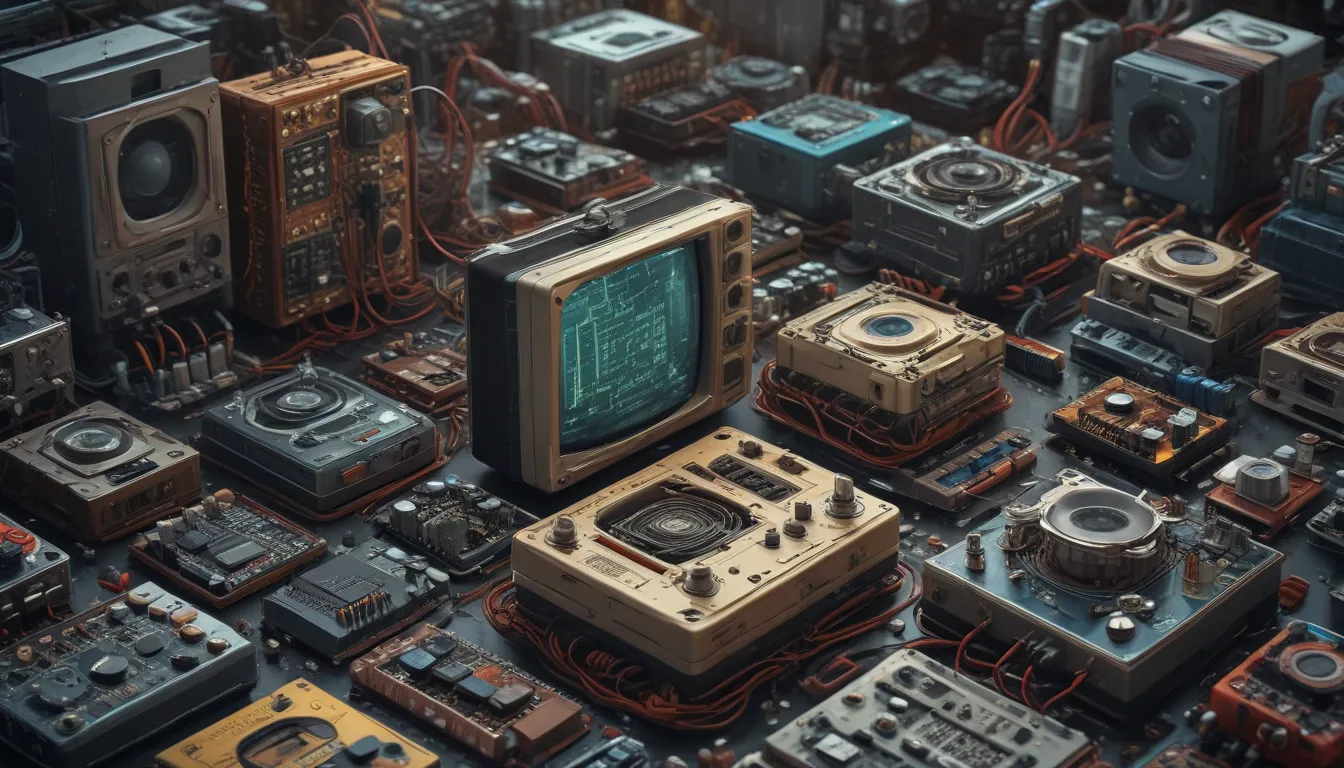A Note About Images: The images used in our articles are for illustration purposes only and may not exactly match the content. They are meant to engage readers, but the text should be relied upon for accurate information.
In today’s fast-paced world, electronics have become an indispensable part of our daily lives, revolutionizing the way we communicate, work, and entertain ourselves. From the first electronic computer to quantum computing, the realm of electronics is teeming with innovation and discovery. Let’s embark on a journey through 20 captivating facts about electronics that showcase their incredible impact on modern society.
The Evolution of Electronics
Electronic devices are ubiquitous in our modern world, permeating every aspect of our lives. Let’s delve into 20 intriguing facts about electronics and uncover how they have shaped our interconnected world.
The Foundation of Modern Technology
At the core of modern technology lies electronics, enabling the creation of devices that have transformed communication, entertainment, and productivity. From smartphones and computers to medical equipment and transportation systems, electronics play a pivotal role in shaping our interconnected world.
Unveiling the First Electronic Computer
In the 1940s, the world witnessed the birth of the ENIAC (Electronic Numerical Integrator and Computer), considered the first electronic general-purpose computer. This groundbreaking invention paved the way for the digital age, laying the foundation for the sophisticated computing systems we rely on today.
The Transistor Revolution
In 1947, the invention of the transistor by John Bardeen, Walter Brattain, and William Shockley at Bell Laboratories marked a significant milestone in electronics. This small yet powerful semiconductor device revolutionized the field, leading to the development of smaller, more efficient electronic devices and integrated circuits.
Integrated Circuits: Small Marvels with Big Impact
Integrated circuits, also known as microchips, have been instrumental in miniaturizing and enhancing the performance of electronic devices. These tiny wonders consist of interconnected electronic components etched onto a small wafer of semiconducting material, enabling the creation of powerful and compact electronic systems.
Connecting the World Through Electronics
The evolution of electronics has revolutionized communication, enabling instantaneous global connectivity. From the invention of the telegraph and telephone to the advent of smartphones and high-speed internet, electronics have continually reshaped the way people interact and share information across the world.
Empowering Healthcare Innovation
The healthcare industry has seen a transformation through electronic innovations, leading to advanced medical imaging systems, life-saving monitoring devices, and sophisticated treatment technologies. Electronics have played a pivotal role in enhancing diagnostic capabilities, improving patient care, and advancing medical research.
Harnessing Renewable Energy with Electronics
Renewable energy sources, such as solar and wind power, heavily rely on electronic systems for efficient generation, storage, and distribution. Electronics enable the seamless integration of renewable energy into the power grid, contributing to sustainable and environmentally friendly energy solutions.
Electronics in Space Exploration
Space exploration depends on electronic systems for spacecraft navigation, communication, and scientific instrumentation. From satellites and rovers to space probes and telescopes, advanced electronics are crucial for data gathering, signal transmission, and groundbreaking discoveries beyond Earth.
The Rise of the Internet of Things
The Internet of Things (IoT) represents a network of interconnected electronic devices and sensors that communicate and exchange data, driving automation and efficiency across various domains. This interconnected ecosystem of smart devices is reshaping industries, homes, and cities, ushering in a new era of technological integration.
Redefining Transportation with Electronics
Electronic systems play a vital role in powering high-speed transportation systems, enhancing efficiency, safety, and comfort in modes of transportation like trains, aircraft, and electric vehicles. From propulsion and navigation to entertainment and safety features, electronics are instrumental in modern transportation.
Quantum Computing: A Glimpse into the Future
The field of quantum computing utilizes the principles of quantum mechanics to develop powerful computing systems with unprecedented speed and capabilities. This revolutionary technology has the potential to transform industries, scientific research, and computational capabilities, ushering in a new era of electronic innovation.
Entertainment and Gaming: Electronic Experiences
The entertainment and gaming industries thrive on electronic advancements, offering immersive audiovisual experiences, interactive gameplay, and virtual reality innovations. Electronics have redefined entertainment, blurring the line between the digital and physical realms for captivating experiences.
Personal Connectivity Through Wearable Electronics
The emergence of wearable electronics, such as smartwatches and fitness trackers, has revolutionized personal connectivity and health monitoring. These innovative devices seamlessly integrate electronics into everyday life, empowering individuals to stay connected, track fitness goals, and monitor vital health metrics with ease.
Environmental Monitoring and Conservation with Electronics
Electronic systems play a crucial role in environmental monitoring and conservation efforts by collecting crucial data on air quality, water resources, and ecosystems. These technologies support sustainable practices, safeguard the environment, and mitigate the impact of human activities on the planet.
Robotics and Automation Powered by Electronics
Robotics and automation rely on advanced electronic systems for precise control, sensory feedback, and autonomous operation in industrial settings, surgical procedures, and autonomous vehicles. Electronics drive the evolution of robotics, enhancing productivity, efficiency, and safety across various sectors.
Revolutionizing Education with Electronics
Electronics have transformed education by providing interactive learning tools, digital resources, and online platforms that expand access to knowledge and facilitate personalized learning experiences. These innovations empower students and educators to engage in dynamic and collaborative learning environments.
Precision Agriculture and Food Security Enabled by Electronics
The integration of electronic systems in agriculture has led to the development of precision farming techniques that enhance crop monitoring, irrigation management, and yield optimization. These advancements contribute to sustainable agriculture practices, food security, and efficient resource utilization to meet global nutritional needs.
Driving Innovation Across Industries with Electronics
Research and development across diverse industries rely on electronic technologies to drive innovation, experimentation, and the creation of cutting-edge solutions. Electronics serve as the cornerstone of progress, enabling breakthroughs that shape the future of humanity.
Fostering Global Connectivity and Collaboration
The interconnected nature of electronic systems fosters global connectivity and collaboration, transcending geographical boundaries and cultural barriers. Through electronic communication platforms, collaborative tools, and digital networks, individuals, organizations, and communities engage in seamless information exchange, cooperation, and problem-solving on a global scale.
The Impact of Electronics on Modern Existence
As we explore the world of electronics, we discover their pervasive influence on modern existence, shaping how we live, work, and interact with the world. The “20 Facts About Electronics” highlight the profound impact of electronic innovations, propelling humanity into a future defined by connectivity, efficiency, and endless possibilities.
Electronics: Shaping the Future
In conclusion, electronics have revolutionized our world, driving innovation and connectivity across various industries. From the transistor to integrated circuits, electronics have continually evolved, transforming the way we live and work. As technology advances, the future of electronics holds boundless possibilities, shaping the world in ways that spark imagination and progress.
Dig Deeper with Our FAQs
What are the different types of electronic devices?
Electronic devices encompass a wide range of products, including smartphones, computers, televisions, digital cameras, and wearable technology. These devices utilize electronic components to function, enabling communication, entertainment, and productivity.
How do electronics impact the environment?
Electronics can have a significant environmental impact through e-waste generation and energy consumption. Proper recycling and responsible disposal of electronic devices are essential to minimize environmental harm. Additionally, energy-efficient electronics contribute to sustainability efforts.
Hungry for More Electrifying Knowledge?
Explore electron shells, electron clouds, and electron configuration notation to delve deeper into the subatomic universe of chemistry and physics. Unravel the mysteries of electrons and their significance in the world of science, preparing to be captivated by the wonders of the subatomic realm.
Did We Spark Your Curiosity?
Our commitment to delivering trustworthy and engaging content is reflected in each fact contributed by real users like you, ensuring diverse insights and credible information. Our dedicated editors meticulously review each submission to maintain the highest standards of accuracy and reliability. Trust in our commitment to quality and authenticity as you explore and learn with us.






